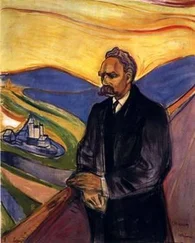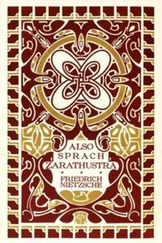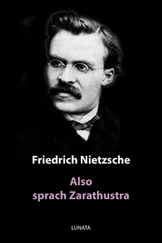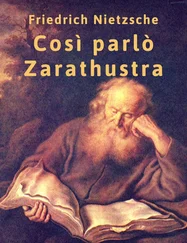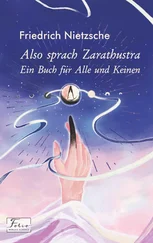Friedrich Nietzsche - Thus Spoke Zarathustra
Здесь есть возможность читать онлайн «Friedrich Nietzsche - Thus Spoke Zarathustra» — ознакомительный отрывок электронной книги совершенно бесплатно, а после прочтения отрывка купить полную версию. В некоторых случаях можно слушать аудио, скачать через торрент в формате fb2 и присутствует краткое содержание. Жанр: unrecognised, на английском языке. Описание произведения, (предисловие) а так же отзывы посетителей доступны на портале библиотеки ЛибКат.
- Название:Thus Spoke Zarathustra
- Автор:
- Жанр:
- Год:неизвестен
- ISBN:нет данных
- Рейтинг книги:5 / 5. Голосов: 1
-
Избранное:Добавить в избранное
- Отзывы:
-
Ваша оценка:
- 100
- 1
- 2
- 3
- 4
- 5
Thus Spoke Zarathustra: краткое содержание, описание и аннотация
Предлагаем к чтению аннотацию, описание, краткое содержание или предисловие (зависит от того, что написал сам автор книги «Thus Spoke Zarathustra»). Если вы не нашли необходимую информацию о книге — напишите в комментариях, мы постараемся отыскать её.
Thus Spoke Zarathustra: A Philosophy Classic, Thus Spoke Zarathustra: A Philosophy Classic
Thus Spoke Zarathustra — читать онлайн ознакомительный отрывок
Ниже представлен текст книги, разбитый по страницам. Система сохранения места последней прочитанной страницы, позволяет с удобством читать онлайн бесплатно книгу «Thus Spoke Zarathustra», без необходимости каждый раз заново искать на чём Вы остановились. Поставьте закладку, и сможете в любой момент перейти на страницу, на которой закончили чтение.
Интервал:
Закладка:
“They understand me not: I am not the mouth for these ears.
Too long, perhaps, have I lived in the mountains; too much have I hearkened unto the brooks and trees: now do I speak unto them as unto the goatherds.
Calm is my soul, and clear, like the mountains in the morning. But they think me cold, and a mocker with terrible jests.
And now do they look at me and laugh: and while they laugh they hate me too. There is ice in their laughter.”
6.
Then, however, something happened which made every mouth mute and every eye fixed. In the meantime, of course, the rope‐dancer had commenced his performance: he had come out at a little door, and was going along the rope which was stretched between two towers, so that it hung above the market‐place and the people. When he was just midway across, the little door opened once more, and a gaudily‐dressed fellow like a buffoon sprang out, and went rapidly after the first one. “Go on, halt‐foot,” cried his frightful voice, “go on, lazy‐bones, interloper, sallow‐face! – lest I tickle you with my heel! What do you here between the towers? In the tower is the place for you, you should be locked up; to one better than thyself you block the way!” – And with every word he came nearer and nearer the first one. When, however, he was but a step behind, there happened the frightful thing which made every mouth mute and every eye fixed – he uttered a yell like a devil, and jumped over the other who was in his way. The latter, however, when he thus saw his rival triumph, lost at the same time his head and his footing on the rope; he threw his pole away, and shot downwards faster than it, like an eddy of arms and legs, into the depth. The market‐place and the people were like the sea when the storm comes on: they all flew apart and in disorder, especially where the body was about to fall.
Zarathustra, however, remained standing, and just beside him fell the body, badly injured and disfigured, but not yet dead. After a while consciousness returned to the shattered man, and he saw Zarathustra kneeling beside him. “What are you doing there?” said he at last, “I knew long ago that the devil would trip me up. Now he drags me to hell: will you prevent him?”
“On mine honor, my friend,” answered Zarathustra, “there is nothing of all that whereof you speak: there is no devil and no hell. Your soul will be dead even sooner than your body: fear, therefore, nothing any more!”
The man looked up distrustfully. “If you speak the truth,” said he, “I lose nothing when I lose my life. I am not much more than an animal which has been taught to dance by blows and scanty fare.”
“Not at all,” said Zarathustra, “you have made danger your calling; therein there is nothing contemptible. Now you perish by your calling: therefore will I bury you with my own hands.”
When Zarathustra had said this the dying one did not reply further; but he moved his hand as if he sought the hand of Zarathustra in gratitude.
7.
Meanwhile the evening came on, and the market‐place veiled itself in gloom. Then the people dispersed, for even curiosity and terror become fatigued. Zarathustra, however, still sat beside the dead man on the ground, absorbed in thought: so he forgot the time. But at last it became night, and a cold wind blew upon the lonely one. Then arose Zarathustra and said to his heart:
“Truly, a fine catch of fish has Zarathustra made today! It is not a man he has caught, but a corpse.
Somber is human life, and as yet without meaning: a buffoon may be fateful to it.
I want to teach men the sense of their existence, which is the Superman, the lightning out of the dark cloud – man.
But still am I far from them, and my sense speaks not unto their sense. To men I am still something between a fool and a corpse.
Gloomy is the night, gloomy are the ways of Zarathustra. Come, you cold and stiff companion! I carry you to the place where I shall bury you with my own hands.”
8.
When Zarathustra had said this to his heart, he put the corpse upon his shoulders and set out on his way. Yet had he not gone a hundred steps, when there stole a man up to him and whispered in his ear – and lo! he that spoke was the buffoon from the tower. “Leave this town, Oh Zarathustra,” said he, “there are too many here who hate you. The good and just hate you, and call you their enemy and despiser; the believers in the orthodox belief hate you, and call you a danger to the multitude. It was your good fortune to be laughed at: and truly you spoke like a buffoon. It was your good fortune to associate with the dead dog; by so humiliating yourself you have saved your life today. Depart, however, from this town, or tomorrow I shall jump over you, a living man over a dead one.” And when he had said this, the buffoon vanished; Zarathustra, however, went on through the dark streets.
At the gate of the town the grave‐diggers met him: they shone their torch on his face, and, recognizing Zarathustra, they sorely derided him. “Zarathustra is carrying away the dead dog: a fine thing that Zarathustra has turned a grave‐digger! For our hands are too cleanly for that roast. Will Zarathustra steal the bite from the devil? Well then, good luck to the repast! If only the devil is not a better thief than Zarathustra! – he will steal them both, he will eat them both!” And they laughed among themselves, and put their heads together.
Zarathustra made no answer, but went on his way. When he had gone on for two hours, past forests and swamps, he had heard too much of the hungry howling of the wolves, and he himself became hungry. So he halted at a lonely house in which a light was burning.
“Hunger attacks me,” said Zarathustra, “like a robber. Among forests and swamps my hunger attacks me, and late in the night.”
“Strange humors has my hunger. Often it comes to me only after a repast, and all day it has failed to come: where has it been?”
And thereupon Zarathustra knocked at the door of the house. An old man appeared, who carried a light, and asked: “Who comes unto me and my bad sleep?”
“A living man and a dead one,” said Zarathustra. “Give me something to eat and drink, I forgot it during the day. He that feeds the hungry refreshes his own soul, saith wisdom.”
The old man withdrew, but came back immediately and offered Zarathustra bread and wine. “A bad country for the hungry,” said he; “that is why I live here. Animal and man come unto me, the anchorite. But bid your companion eat and drink also, he is wearier than you.” Zarathustra answered: “My companion is dead; I shall hardly be able to persuade him to eat.” “That does not concern me,” said the old man sullenly; “he that knocks at my door must take what I offer him. Eat, and fare you well!”
Thereafter Zarathustra again went on for two hours, trusting to the path and the light of the stars: for he was an experienced night‐walker, and liked to look into the face of all that slept. When the morning dawned, however, Zarathustra found himself in a thick forest, and no path was any longer visible. He then put the dead man in a hollow tree at his head – for he wanted to protect him from the wolves – and laid himself down on the ground and moss. And immediately he fell asleep, tired in body, but with a tranquil soul.
9.
Long slept Zarathustra; and not only the rosy dawn passed over his head, but also the morning. At last, however, his eyes opened, and amazedly he gazed into the forest and the stillness, amazedly he gazed into himself. Then he arose quickly, like a seafarer who all at once sees the land; and he shouted for joy: for he saw a new truth. And he spoke thus to his heart:
Читать дальшеИнтервал:
Закладка:
Похожие книги на «Thus Spoke Zarathustra»
Представляем Вашему вниманию похожие книги на «Thus Spoke Zarathustra» списком для выбора. Мы отобрали схожую по названию и смыслу литературу в надежде предоставить читателям больше вариантов отыскать новые, интересные, ещё непрочитанные произведения.
Обсуждение, отзывы о книге «Thus Spoke Zarathustra» и просто собственные мнения читателей. Оставьте ваши комментарии, напишите, что Вы думаете о произведении, его смысле или главных героях. Укажите что конкретно понравилось, а что нет, и почему Вы так считаете.

